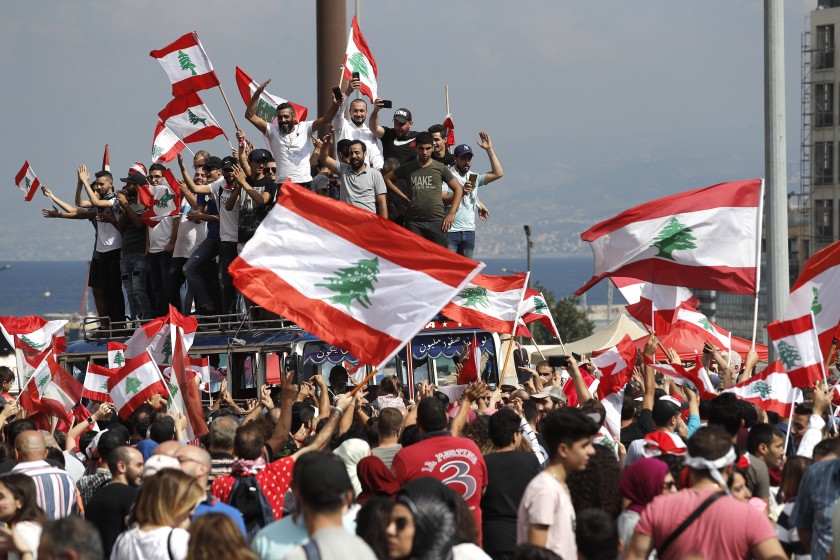
Lebanon: Ukraine, the world, and the domino effect

By Hasan Shreyf August 11 2022
Table of Contents 1. INTRO/ 2. TWO
INTRO:
For thirty years, Lebanon has known unrest. Never a moment of peace and stability. For thirty years, in the wake of a 15-year long civil war, Lebanon has been trying to rise from the ashes and rebuild. After the end of the civil war, with the warlords in power, they set out a rescue plan for the country, but it was nothing more than a ticking bomb. The first of these policies was the peg of the currency (Lira) to the US Dollar without any regard to the fluctuations of the market, relying only on attracting investors with high interest rates in banks.
This policy discouraged any actual investment and, in turn, destroyed every sector of the economy, especially the agricultural and industrial sectors. With every sector destroyed, the country turned its economy to the banking sector and the constant influx of money coming from immigrants. They did not stop there; with a methodical approach, the ruling class, a class of capitalist warlords, privatized every section of the economy, sold the country's riches to the highest bidder. The seed for the economic crisis was then firmly planted.
In 2019, the bubble burst. People went to the streets demanding change, for the destruction of the system. It certainly wasn't the first time people revolted during these past thirty years, but it was the biggest one. This single event, the 17th of October movements, united a scattered people, a society torn by a civil war where brother killed brother. The government resigned, and another came without any elections. New faces came, but it was all the same. They were merely puppets for the same political leaders who held the country hostage for decades.
The Lira fell, inflation rivaled that of Venezuela, and an already intolerable life became impossible. COVID didn't spare anyone in the world. It was the final nail in the coffin of our already dying health sector. Our near-bankrupt government stopped all kinds of healthcare. Our hospitals were overrun with patients and underfunded. Due to the inflation and prices skyrocketing, health workers and doctors (and everyone else) could not even cover the travel expenses to work.
18:04, August 4th, 2020 This date is forever inscribed in the memory of every Lebanese, the day of the Beirut Port Explosion. Not only did it obliterate the port, but it destroyed our largest grain silos. With an economic crisis crippling the country, we already had a shortage of fuel, grain, and since our country solely relies on imports, our situation was dire. We were running on our last reserves.

17th October movements
TWO:
To talk about a grain/wheat crisis in a land that was once called, during Roman times, the granaries of Rome, rather seems quite odd at first, but from the outline drawn above, we can see how capitalism devoured this land inside out. The jaws and insatiable hunger of capitalism drained every drop of hope of recovery from the people. Lebanon sits in a geopolitical hotspot, right in the middle of the near east. Such a small state is bound to be the host of regional and global conflicts.
Whether it was the east-west proxy wars, the Syrian civil war, or Israeli aggression in Occupied Palestine, Lebanon was always directly involved or hit by a stray bullet. The next bullet came once again from Putin (the first was Syria) and his invasion of Ukraine in February of 2022. His imperialist invasion forced millions of Ukrainians to flee their homes and destroyed their country. The ripples of this war were felt around the globe, prices of fuel, gas, and wheat increased.
Since Lebanon imports more than 80% of its wheat from Ukraine and, adding to that, our crumbling economy, our demolished port and grain silos, we were set for yet another disaster. By 2022, the working class had nothing left. After three years of hardships, people were out of their jobs because they couldn't afford fuel to get to their jobs, they couldn't support the greed of the landowners who were doubling and tripling rents, they've been living without electricity and water, and now bread.
Each day, from dusk till dawn, is a struggle for the working man. At 4 AM each morning, a father, a mother wakes up and goes to the only local bakery in town to line up in a queue of hundreds of people. Fighting erupts almost daily. People even die in these fights, all for pack bread. This is the daily reality of the Lebanese and there seems to be no end in sight. War is still raging in Ukraine and our economy is on life support. It's been three months and we still haven't formed a government. Day after day we see the fall of capitalism, or is it the success? The success in sucking every last drop of blood from the masses.
We have to return to the movements of October on October 17, 2019. Once again, meet in the streets, all our brothers, the youth, the workers, the poor merchants, and the peasants. Not only to end the government, but also capitalism. We need a workers' and popular government that directs the country's resources to the people, to work, health, and education, in alliance with the peoples of our region who seek the same way out.


